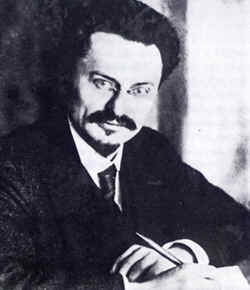Leon Trotsky
Leon Trotsky was one of the foremost figures in the Russian Revolution. Trotsky, along with Vladimir Lenin, gave the move for revolution both drive and organisation. Trotsky’s leadership during the Russian Civil War probably saved the Bolshevik Revolution of November 1917.
 |
Leon Trotsky was born in 1879 at Ianovka in the Ukraine. His parents were Jews and his original surname was Bronstein. Trotsky was a highly intelligent pupil at school though his intellectual arrogance meant that he had few good friends. He got involved in revolutionary groups while still a teenager and was arrested at the age of 19 for writing and printing revolutionary literature and for helping to organise a strike. Trotsky was kept in solitary confinement for three months and then sent to Siberia. He escaped from prison and fled to London where he joined up with Lenin and other revolutionaries in October 1902. In 1905 Trotsky returned to St Petersburg to help organise the city’s first soviet. He was once again arrested and sent to Siberia. He escaped once again and spent a number of years in Western Europe and America.
Trotsky played no part in the March Revolution but returned to Russia from America in May 1917 when the Provisional Government was in power. His organisational skills were quickly recognised and Trotsky was chairman of the powerful Petrograd Soviet by the time of the November Revolution. During the actual revolution, Trotsky organised the Red Guards in what was essentially a bloodless takeover of Petrograd. Lenin charged Trotsky with getting Russia out of World War One and the end result was the very harsh Treaty of Brest-Litovsk.
Though the Bolsheviks controlled Petrograd and Moscow and the land in between, they had no power over the rest of the vast country. many groups existed that opposed the Bolsheviks and a civil war was inevitable. Lenin made Trotsky Commissar of War and gave him full control in how the newly formed Red Army went about its work. While Lenin did the work required for the area that the Bolsheviks controlled, Trotsky set about eradicating those who wanted the destroy the Bolsheviks. Trotsky, untrained as a military commander, excelled in his job. Though the Whites were hopelessly disunited, there were numerous armies that had to be defeated. The Red Army was successful and the leadership provided by Trotsky cannot be undervalued. His philosophy was simple. If a commander in the field failed, he paid the price. If a whole unit was at fault, they paid the price. Such draconian policies helped to instill into the Red Army the very discipline that was fundamentally missing in the various White armies. Trotsky frequently visited his troops at the front in his famous armoured train so he could never be seen as a military commander who stayed away from the fighting.
| “The flabby, panicky mob would be transformed in two or three weeks into an efficient fighting force. What was needed for this? It needed good commanders, a few dozen experienced fighters, a dozen or so Communists ready to make any sacrifice, boots for the bare-footed, a bath house, am energetic propaganda campaign, food, underwear, tobacco and matches. The train took care of all this.”Trotsky – describing how the Red Army was created. “I issue this warning. If any detachment retreats without orders, the first to be shot will be the commissar, the second the commander.” Trotsky issuing orders to frontline troops. |
By 1921, the civil war had been won and it was assumed that Trotsky would be the logical successor to Lenin who by now was suffering from ill-health. In fact, Trotsky’s success in keeping the revolution alive had made him enemies within the Communist (Bolshevik) Party. Joseph Stalin had acquired a number of seemingly unimportant party positions in his rise to power but when combined, these positions gave him a unique insight into the party – those who would support Stalin and those who disliked Trotsky.
In January 1924, Lenin died and a successor was needed. However, Trotsky’s arrogance had won him few friends. His insistence on ‘Permanent Revolution‘ had few supporters while Stalin’s belief of ‘Socialism in One Country’ had far more. From 1923 on, Trotsky had also been experiencing illness in the form of fevers and his strength had been badly affected by this. With few friends and a weakened body, Trotsky was not in a position to defend himself against a man who had quietly and effectively built up a large power base within the party. By 1925, Trotsky was all but alone within the party and Stalin’s power was such that by 1927, he felt confident enough to expel Trotsky from the Communist Party and in January 1929, he was expelled from Russia itself.
Few countries in Europe were willing to take on a man who was associated not only with revolution but also, as a result of the revolution’s success, associated with the murder of the Romanovs. Trotsky lived for a while in Turkey and France but moved to Mexico where he spent the rest of his life. Trotsky was murdered by a Stalinist agent on August 20th 1940.
Related Posts
- Permanent Revolution Permanent Revolution was Leon Trotsky's belief for the future of world communism. Permanent Revolution, as a belief, was also to bring Trotsky into…